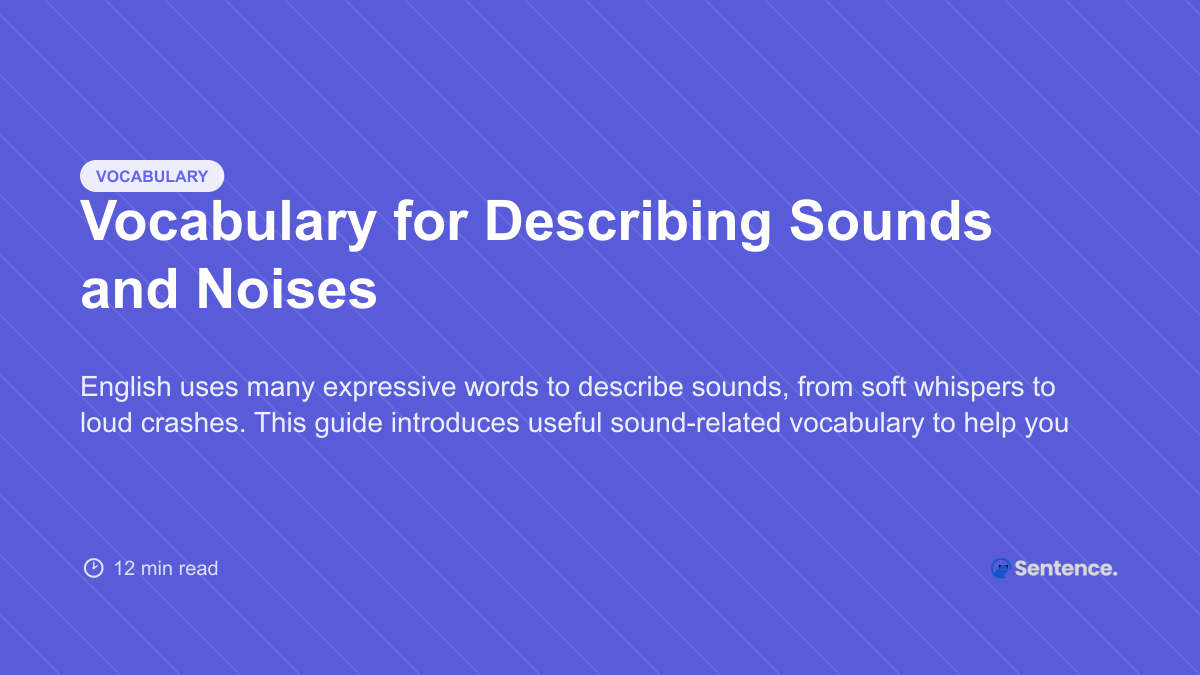
Vocabulary for Describing Sounds and Noises
English uses many expressive words to describe sounds, from soft whispers to loud crashes. This guide introduces useful sound-related vocabulary to help you describe what you hear clearly and naturally.

English uses many expressive words to describe sounds, from soft whispers to loud crashes. This guide introduces useful sound-related vocabulary to help you describe what you hear clearly and naturally.
Sounds are part of daily life, and English has many vivid words to describe them. Yet many learners rely only on basic verbs like “hear,” “sound,” or “make noise.” Learning more specific vocabulary helps you express exactly what kind of sound something makes, whether it’s loud, soft, sudden, or continuous.
This article introduces practical adjectives and verbs for describing different kinds of sounds. You’ll learn clear meanings, examples, and categories so you can talk about everyday noises more naturally and effectively.
Some sounds are quiet, calm, or barely noticeable. These words help describe peaceful noises or subtle background sounds. They are useful in storytelling, nature descriptions, and daily conversations.
| Word | Meaning | Example |
|---|---|---|
| whisper | to speak very softly | They whispered during the movie. |
| rustle | a soft sound of things moving lightly | The leaves rustled in the wind. |
| murmur | a low, continuous, gentle sound | A quiet murmur filled the room. |
| hum | a low, steady sound | The air conditioner hummed softly. |
These soft sound verbs work well when describing quiet conversations, nature scenes, or machines operating in the background.
Some sounds are sharp, noisy, or attention-grabbing. English uses strong verbs to describe sounds that break silence or create impact. These words are useful in action stories, news reports, or emergency descriptions.
| Word | Meaning | Example |
|---|---|---|
| bang | a loud, sudden noise | The door banged shut in the wind. |
| crash | a loud sound of something breaking | We heard a loud crash outside. |
| roar | a deep, powerful sound | The crowd roared when the team scored. |
| boom | a deep, explosive sound | Thunder boomed overhead. |
These verbs help create intensity and drama when describing loud noises or powerful events.
Some sounds repeat or continue for a long time. English uses specific verbs to show rhythm, repetition, or ongoing noise. These words help describe machines, animals, and environmental sounds.
| Word | Meaning | Example |
|---|---|---|
| buzz | a low continuous sound, often from insects or machines | The bees buzzed around the flowers. |
| click | a short, sharp sound | The keyboard clicked as he typed. |
| tap | to make light, repeated sounds | She tapped her fingers on the table. |
| rattle | a repeated shaking sound | The coins rattled in his pocket. |
These verbs help describe rhythms and repetitive sounds that create mood or atmosphere in writing.
Many sounds come from people or animals. English uses expressive verbs to describe laughter, crying, barking, or other natural noises. These words are useful in conversations, storytelling, and everyday explanations.
| Word | Meaning | Example |
|---|---|---|
| giggle | a light, playful laugh | The children giggled at the joke. |
| sob | to cry loudly and uncontrollably | She sobbed after hearing the news. |
| bark | the loud sound a dog makes | The dog barked at the mail carrier. |
| chirp | a short, high sound from birds | The birds chirped early in the morning. |
These verbs help describe emotional responses, animal behavior, and natural soundscapes with more detail and accuracy.
Sound vocabulary becomes easier to remember if you connect each word to a familiar noise. Think of the hum of an air conditioner, the bang of a closing door, or the chirp of early-morning birds. These mental associations help you choose the right verb naturally when speaking or writing about sounds.
Memory Tip:
Imagine the sound in your head before choosing the verb — sharp, soft, long, or sudden?
Answers: rustled / boomed / barked / buzzed
⭐ Pro Tip: Specific sound words make descriptions richer and help readers visualize scenes more clearly.
English offers many expressive words to describe different kinds of sounds, from gentle whispers to explosive crashes. Learning these verbs helps you communicate more vividly and naturally in conversations, stories, and everyday explanations. With practice, you’ll be able to choose the perfect word for any sound you hear.